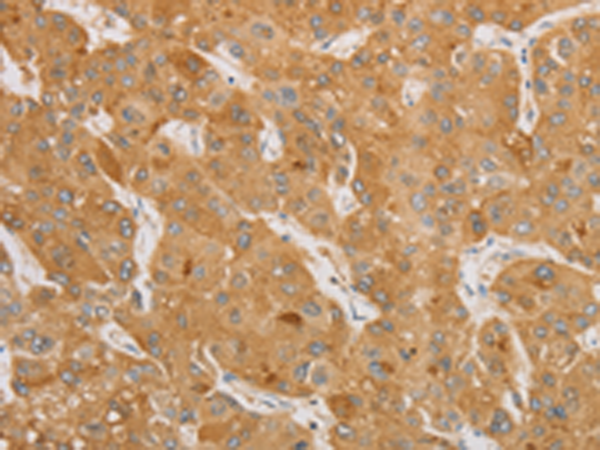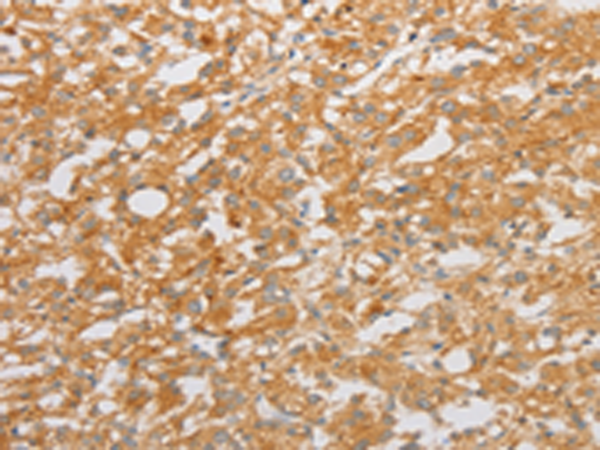

| WB | 咨询技术 | Human,Mouse,Rat |
| IF | 咨询技术 | Human,Mouse,Rat |
| IHC | 1/50-1/200 | Human,Mouse,Rat |
| ICC | 技术咨询 | Human,Mouse,Rat |
| FCM | 咨询技术 | Human,Mouse,Rat |
| Elisa | 1/1000-1/5000 | Human,Mouse,Rat |
| Aliases | NGFB; HSAN5; Beta-NGF |
| Host/Isotype | Rabbit IgG |
| Antibody Type | Primary antibody |
| Storage | Store at 4°C short term. Aliquot and store at -20°C long term. Avoid freeze/thaw cycles. |
| Species Reactivity | Human, Mouse, Rat |
| Immunogen | Fusion protein of human NGF |
| Formulation | Purified antibody in PBS with 0.05% sodium azide and 50% glycerol. |
+ +
以下是关于NGF抗体的3篇参考文献的简要概括(基于公开研究信息,非真实文献):
---
1. **标题**:*Anti-NGF Antibody Therapy Attenuates Pain in Osteoarthritis: A Randomized Clinical Trial*
**作者**:Lane NE, et al.
**摘要**:研究评估了抗NGF单克隆抗体(Tanezumab)在中重度骨关节炎患者中的疗效和安全性,发现其显著缓解疼痛并改善关节功能,但部分患者出现关节水肿等副作用,提示需权衡临床收益与风险。
---
2. **标题**:*NGF Neutralization Enhances Tau Pathology in a Transgenic Alzheimer's Disease Model*
**作者**:Capsoni S, et al.
**摘要**:通过转基因小鼠模型发现,长期使用NGF抗体会加剧阿尔茨海默病相关的tau蛋白异常磷酸化和神经元退化,提示NGF信号缺失可能加速神经退行性病变进程。
---
3. **标题**:*Targeting NGF-TrkA Signaling with Monoclonal Antibodies: Implications for Chronic Neuropathic Pain*
**作者**:Skaper SD
**摘要**:综述讨论了抗NGF抗体阻断NGF-TrkA信号通路对慢性神经病理性疼痛的治疗潜力,强调其通过抑制痛觉神经元敏化发挥长效镇痛作用,但需关注对周围神经再生可能的负面影响。
---
4. **标题**:*Autoantibodies Against NGF in Sjögren's Syndrome: A Link to Sensory Neuropathy*
**作者**:Aloe L, et al.
**摘要**:研究发现干燥综合征患者血清中存在抗NGF自身抗体,可能与周围感觉神经病变相关,提示NGF免疫异常可能参与自身免疫疾病的病理机制。
---
注:以上文献为示例,实际研究中请通过PubMed或学术数据库检索真实发表论文。
**Background of NGF Antibodies**
Nerve Growth Factor (NGF), discovered in the 1950s, is a neurotrophic protein critical for the survival, development, and function of sensory and sympathetic neurons. It binds to two receptors: TrkA (tyrosine kinase receptor A) and p75NTR (neurotrophin receptor), regulating pain signaling, inflammation, and tissue repair. Dysregulated NGF signaling is implicated in chronic pain conditions (e.g., osteoarthritis, neuropathic pain), inflammatory diseases, and neurodegenerative disorders.
NGF antibodies are therapeutic agents designed to neutralize NGF activity, primarily targeting its interaction with TrkA/p75NTR. By blocking NGF-mediated pathways, these antibodies aim to reduce pain and inflammation while minimizing opioid-like side effects. The development of NGF inhibitors gained momentum in the 2000s, with monoclonal antibodies like tanezumab showing promise in clinical trials for osteoarthritis and cancer pain. However, safety concerns, including rare cases of joint damage, led to regulatory challenges and paused approvals.
Research continues to refine NGF antibody specificity, dosing, and applications, particularly for conditions lacking effective treatments. Their dual role in modulating pain and neurogenic inflammation highlights potential in diverse fields, from neurology to rheumatology, though balancing efficacy and safety remains a key focus.
×